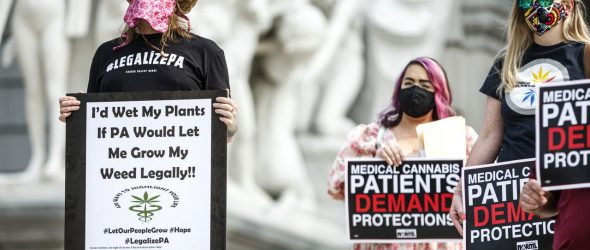“Four score and seven years ago” are words that many associate with one of Abraham Lincoln’s most famous speeches delivered at the dedication of the National Cemetery of Gettysburg but that also is how long marijuana has been illegal in Pennsylvania.
At a Wednesday news conference on the Capitol steps urging action to reverse that law, Les Stark, executive director of Keystone Cannabis Coalition, likened Lincoln’s address delivered on the Gettysburg Battlefield to what he termed a “war on the people over plant that has always been here with us.”
He pointed out it was “four score and seven years ago” when Pennsylvania Republican prohibitionist Gov. Gifford Pinchot declared that so-called war by signed a law banning marijuana in the state, which he said took effect Sept. 1, 1933.
“Eighty seven years, that’s how long we have suffered,” Stark said “What has the war on the people over cannabis wrought? Is there less cannabis in Pennsylvania today than there was in 1933? … Wake up.”
Stark was among the advocates and legislators who joined their voices with Gov. Tom Wolf and Lt. Gov. John Fetterman at separate events on Wednesday to call on the General Assembly to pass legislation that would legalize recreational marijuana for adult use, decriminalize cannabis, and expunge the records of those who have low-level, non-violent marijuana convictions.
During his and Fetterman’s news conference outside the Pennsylvania Emergency Management Agency headquarters, Wolf noted New Jersey voters will decide whether to legalize recreational, adult-use cannabis when they go to the polls on Nov. 3.
“If they vote to legalize it, we will have given up the opportunity to gain the revenue that will definitely go across the border to New Jersey,” Wolf said.
Fetterman noted that 40% of Pennsylvania’s population would then live within a half-hour drive of being able to buy marijuana legally.
“We think our farmers would grow better legal marijuana than New Jersey’s,” the lieutenant governor said. “We think we should reap the benefits, not New Jersey. I don’t understand why this is even an issue especially during this pandemic. Let’s get serious.”
This is the second time in two weeks Wolf and Fetterman have called for action on this issue.
Despite their pleas, leaders of the House and Senate Republicans, the party that controls both chambers, have indicated they are not ready to move on this issue this fall.
House Majority Leader Kerry Benninghoff, R-Centre County, said he finds it interesting that the governor has made this a priority at a time when the state is in the throes of an opioid addiction crisis that is claiming hundreds of Pennsylvanians’ lives each month.
“We hear nothing about that. The only priority is trying to legalize recreational marijuana to have more dollars to spend on new programs,” Benninghoff said, after an unrelated morning news conference where a bipartisan group of lawmakers urged the governor to sign a bill allowing local officials to make decisions on school sports and crowd size.
“We’re focused on balancing a budget, getting people back to work so they can earn an income for themselves and their families and contribute to our commonwealth, getting children to school safely and happily. I just don’t understand that as a priority,” Benninghoff said.
Senate Majority Leader Jake Corman, R-Centre County, said who in 2018 called the idea of legalizing pot “reckless and irresponsible,” now seems at least willing to consider it. In a statement issued last week after the governor renewed his call for legalizing pot, Corman said laws should be changed because they are good policy for the people of Pennsylvania, not because of their potential to generate money. However, he did express a willingness to vet legislation through the chamber’s committee process.
At the Capitol news conference, marijuana legalization activists and lawmakers offered their litany of reasons why they feel it would be good policy.
Among them, they said most people no longer consider cannabis use to be a serious crime. Polls and a listening tour by Fetterman last year indicate a majority of Pennsylvanians’ support legalization. It is used by some people for pain relief instead of turning to opioids. It would make cannabis products safer. It would become a new cash crop for farmers. Decriminalizing it and expunging marijuana convictions from criminal records would give people a second chance at getting their life back on track.
On top of all that, Sen. Sharif Street, D-Philadelphia, said there is the money that the state can make off of it. Potentially, it could generate more than half a billion dollars by Auditor General Eugene DePasquale’s estimate. Fetterman said that would add up to billions of dollars over time that Pennsylvania would be leaving on the table.
“The time to end the prohibition against cannabis has come,” Street said. “There are so many reasons we should move forward with this and almost no reason not to.”
Jan Murphy may be reached at jmurphy@pennlive.com. Follow her on Twitter at @JanMurphy.


